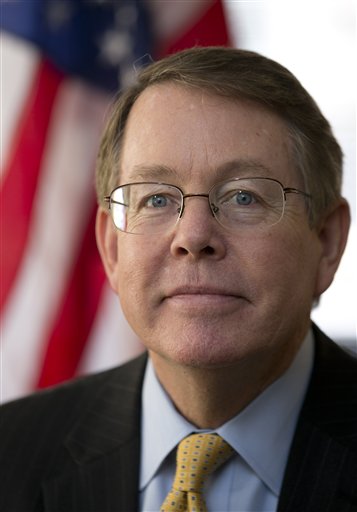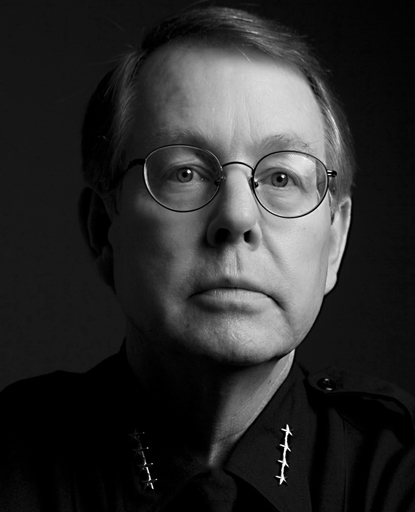American Policing in 2022 Goes to Yale: One on One with Jim Bueermann
 Jim Bueermann is the current president of the Police Foundation, a 33-year veteran of the Redlands (California) Police Department, NIJ Fellow, George Mason University Fellow, and Hall of Famer at George Mason University’s Center for Evidence-Based Crime Policy and the College of Social and Behavioral Sciences at California State University, San Bernardino, California. Jim is also an author featured in the COPS Office publication, American Policing in 2022: Essays on the Future of a Profession.
Jim Bueermann is the current president of the Police Foundation, a 33-year veteran of the Redlands (California) Police Department, NIJ Fellow, George Mason University Fellow, and Hall of Famer at George Mason University’s Center for Evidence-Based Crime Policy and the College of Social and Behavioral Sciences at California State University, San Bernardino, California. Jim is also an author featured in the COPS Office publication, American Policing in 2022: Essays on the Future of a Profession.
Jim was recently invited to present to an “Innovations in Policing” class at the Yale Law School taught by Professors Tracy Meares and Tom Tyler. COPS Office Senior Analyst, Dr. Debra R. Cohen McCullough, asked Jim a few questions about his experience.
CP Dispatch: How did you become involved in talking about policing to Yale Law School students?
Bueermann: Innovation in Policing is a third year policy-oriented class that gives Yale Law School students an opportunity to discuss real-world policy implications in policing, and I was one of several policing practitioners they invited. Asking practitioners with a reputation for innovating to present on a variety of topics gives the students an opportunity to move beyond theory and engage in meaningful dialogue with practitioners. In my case, it gave students an exposure to real world issues of policing.
CP Dispatch: What did you cover during your talk?
Bueermann: My discussion with the students included a technical discussion of the general diffusion of innovation. During the portion of the presentation that focused on policing, I emphasized the value of diffusing the future-centered insights of key thought leaders in contemporary policing through products like the COPS Office publication, American Policing in 2022.
Each student was provided with a copy of the COPS Office publication to use as a companion piece to the class. Using this book as a reference facilitated the class discussion and each student’s understanding of my presentation on innovation in policing.
For example, I referenced my own essay, “Preparing the Police for an Uncertain Future: Four Guiding Principles.”1 In that essay, I encourage police departments to start preparing for uncertain futures by becoming value driven, a catalyst for change, legitimate in the eyes of the community and a learning organization. Among other topics, I also referenced essays from the book that focused on predictive policing, enhancing a community's collective efficacy, performance measurements, and police legitimacy.2
CP Dispatch: Was there anything in particular about American Policing in 2022 that seemed to pique the students’ curiosity?
Bueermann: The students were very interested in how policing leaders thought about contemporary and future issues. They were also very interested in what these leaders thought about the policy implications of this future thinking. They expressed an appreciation of this book of essays as an invaluable resource for capturing this knowledge about the “how” and “what” of policing leadership (I suspect few of them actually knew a “policing leader”).
Their questions were focused and covered a wide breadth of topics. For example, one student asked why more police departments do not utilize a more comprehensive approach to evidence-based policing strategies. Another followed-up with a question that focused on the barriers that keep innovations, community policing, and evidence-based practices from becoming the norm in police departments. Finally, there were several specific questions about specific policing strategies (e.g., police surveillance and body worn cameras) and the overall direction policing is taking in America.
CP Dispatch: Jim, in your essay you wrote “Police leaders are obligated to help their followers understand not just ‘what’ to think, but ‘how’ to think about the world ahead of them.” What was it like discussing the “how” at Yale?
Bueermann: I take great enjoyment in discussing policing with young adults like the students in this class. It is personally energizing. It reminds me of what it was like to be young and full of ideas about how the world should operate.
 Not only do they bring to the discussion an interesting generational perspective that is different from mine but also they are generally very interested in why policing systems operate the way they do and frequently pose the question “Why can’t it be done differently to achieve better outcomes?” They represent the leaders of the future. I think it’s incumbent upon us “elders” to listen to their opinions, consider their perspectives, and engage in collaborative dialogue about the “why not’s?” of policing’s future.
Not only do they bring to the discussion an interesting generational perspective that is different from mine but also they are generally very interested in why policing systems operate the way they do and frequently pose the question “Why can’t it be done differently to achieve better outcomes?” They represent the leaders of the future. I think it’s incumbent upon us “elders” to listen to their opinions, consider their perspectives, and engage in collaborative dialogue about the “why not’s?” of policing’s future.
CP Dispatch: I remember you jumped at the chance to participate in the American Policing in 2022 project (thank you!) and you played a large role in this year’s Jerry Lee Symposium. Jim, what makes you so excited about the future of policing and/or what would you say to those who predict “more of the same”?
Bueermann: Really, there’s no such thing as “more of the same” in policing. That’s because there’s no such thing as “the same” in society anymore. As we speak, it is changing in substantive ways. And the rate of change is increasing at an exponential rate. Since it is in society that the police do their work, the need for policing to embrace change, a tolerance for ambiguity, and to anticipate where policing’s challenges are going to be seems a rather self-evident guiding principle for effective police leaders. Like it or not, the future is the place we will all live. Whether it be tomorrow, or 10 years from now, successful police leaders will lead their agencies in a uncertain future only by thinking, and then acting, on our shared understanding of the future. This is why the American Policing in 2022 project is so important. Since we can anticipate much of the future, we can also plan for it. We now have the ability to understand community needs and deliver policing services in a way we didn’t even dream about when I started my career in the 70s. The future of policing, even with constrained budgets, has never been brighter. I truly envy tomorrow’s police leaders.
1Bueerman, Jim. 2012. “Preparing the Police for an Uncertain Future: Four Guiding Principles.” American Policing in 2022: Essays on the Future of a Profession. Washington, D.C.: U.S. Department of Justice COPS Office 17–21.
2Glensor, Ronald W., and Peak, Kenneth J., “New Police Management Practices and Predictive Software: A New Era They Do Not Make” (p. 11); Davis, Michael A., “Community Building as Crime Control” (p. 29); Frazier, Michael T. “Quality and Performance Management: An Innovative Approach to Future Police Management” (p.23) ; Scott, Michael S., “What Gets Measured Is the Matter: The Need for Leading Public Safety Indicators” (p. 43).
American Policing in 2022 Goes to Yale | SROs and Information Sharing | Preparing officers for a community oriented department | What we can do about street harassment | 2013 Sutin Civic Imagination Award | Medal of Valor and Badge of Bravery

